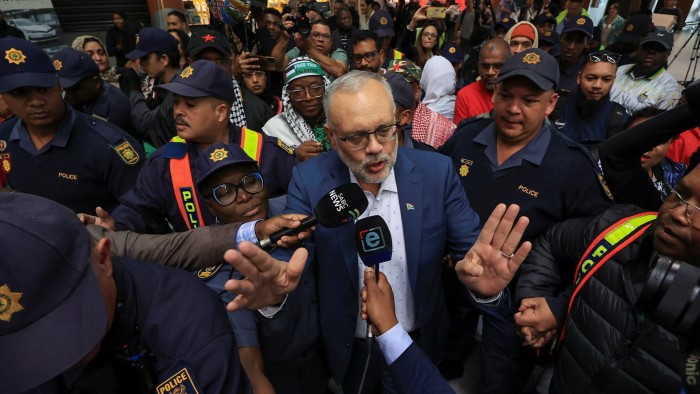Unlock the White House Watch newsletter for free
South Africa’s unity government is facing a dilemma over the appointment of a new ambassador to the US following the expulsion of the previous ambassador. The tension with the Trump administration has highlighted divisions within the 10-party coalition government.
The African National Congress, led by President Cyril Ramaphosa, insists that the decision to appoint a new US ambassador lies solely with the president. This position is critical as it involves managing the increasingly strained relationship with the United States, the world’s largest economy. However, coalition partners are pushing for broader consultation in the selection process.
Potential candidates for the ambassadorship include Trevor Manuel, a veteran ANC member and former finance minister, as well as Andries Nel, the current deputy justice minister who has maintained a low profile during his tenure in government. Helen Zille, chair of the Democratic Alliance, another key coalition partner, has expressed her preference for Tony Leon, a former ambassador and leader of the DA party.
The outgoing ambassador, Ebrahim Rasool, was declared persona non grata by US Secretary of State Marco Rubio after criticizing President Trump’s actions during a webinar. This incident has further strained relations between the two countries, with Trump taking a hardline stance against South Africa on various issues.
There are differing opinions within the coalition on the choice of the new ambassador. While Zille believes that Leon would be a strong candidate due to his previous experience, the ANC maintains that the president has the final say in the matter. Some within the ANC suggest that appointing a non-party member may be more prudent given the current political climate.
The deteriorating relationship between the US and South Africa has been exacerbated by recent actions from the Trump administration, including freezing funding to South Africa and offering asylum to white Afrikaners. Elon Musk, a South African-born adviser to Trump, has also made controversial claims about the country’s laws and treatment of white farmers.
The strained ties with the US pose a challenge for President Ramaphosa, who leads a fragile coalition government. The DA, a long-time rival of the ANC, has raised concerns about the government’s foreign policy decisions, particularly its stance on Palestine and relationships with countries like China and Iran.
As the search for a new ambassador continues, it is clear that South Africa needs to carefully consider its choice to advance its national interests while maintaining an independent foreign policy stance. The decision will have far-reaching implications for the country’s diplomatic relations and international standing. There is a growing concern among scientists and environmentalists about the impact of climate change on our planet. The evidence is clear – temperatures are rising, ice caps are melting, and extreme weather events are becoming more frequent. But what does this mean for the future of our planet and its inhabitants?
One of the most significant consequences of climate change is the loss of biodiversity. As temperatures continue to rise, many species are struggling to adapt to their changing environments. This has led to a rapid decline in the number of plant and animal species, with some estimates suggesting that we are currently in the midst of a mass extinction event.
The loss of biodiversity has far-reaching consequences for ecosystems around the world. Many species play a vital role in maintaining the delicate balance of their habitats, and the disappearance of one species can have a domino effect on the entire ecosystem. This can lead to a decrease in food sources for other animals, a disruption in pollination patterns, and a decline in overall ecosystem health.
In addition to the loss of biodiversity, climate change is also having a significant impact on human populations. Rising sea levels are threatening coastal communities, extreme weather events are causing widespread destruction, and changes in rainfall patterns are leading to food shortages in many parts of the world. These effects are disproportionately impacting marginalized communities who are less equipped to adapt to the changing climate.
Despite these challenges, there is still hope for the future. Many scientists and environmentalists are working tirelessly to find solutions to combat climate change and protect our planet’s biodiversity. From renewable energy sources to sustainable farming practices, there are a variety of ways that individuals and communities can work together to mitigate the effects of climate change.
It is clear that the time to act is now. Climate change is not a problem that can be ignored or put off for future generations to deal with. We all have a responsibility to take action and make changes in our daily lives to help protect our planet and ensure a sustainable future for all. By working together, we can make a difference and create a world where biodiversity thrives and future generations can enjoy the beauty of our planet.








